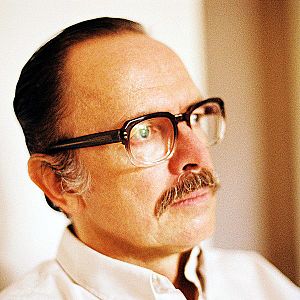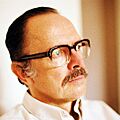David Woodard facts for kids
Quick facts for kids
David Woodard
|
|
|---|---|

Woodard in 2020
|
|
| Born | April 6, 1964 Santa Barbara, California, U.S. |
| Occupation |
|
| Citizenship |
|
| Literary movement | Postmodernism |
| Spouse | Sonja Vectomov |
| Children | 2 |
| Signature | |
David James Woodard, born on April 6, 1964, is an American conductor and writer. He is known for his unique musical projects and his interest in unusual historical places.
Contents
David Woodard's Creative Projects
The Dreamachine
In the 1990s and early 2000s, David Woodard created copies of the Dreamachine. This special lamp uses flashing lights to create interesting visual effects. It was originally invented by Brion Gysin and Ian Sommerville.
Woodard contributed one of his Dreamachines to an art show at the Los Angeles County Museum of Art (LACMA) in 1996. This show was about the artist William S. Burroughs. Later, in 2002, one of Woodard's machines was sold to a private collector. Another one of his Dreamachines is still on display at the Spencer Museum of Art in Lawrence, Kansas.
Prequiem Music
During the 1990s, Woodard came up with a new word: prequiem. This word combines "preemptive" (meaning done before something happens) and "requiem" (a type of music often played for someone who has died). Woodard's prequiem music is a special kind of music he composes to be played for someone just before or during their death. It's part of his Buddhist practice.
In 2001, Woodard was asked to conduct a prequiem Mass for a person facing a difficult situation. He agreed and performed a part of his music piece called Ave Atque Vale (which means "Hail and Farewell"). He performed it with a local brass choir at a church near the USP Terre Haute in Terre Haute, Indiana. Important religious leaders, including Archbishop Daniel M. Buechlein and Cardinal Roger Mahony, later asked Pope John Paul II to bless Woodard's musical score.
Public Service and Expeditions
Councilman in Juniper Hills
In 2003, David Woodard was elected as a councilman in Juniper Hills, California, which is in Los Angeles County. As a councilman, he suggested that Juniper Hills form a "sister city relationship" with a town in Paraguay called Nueva Germania.
Exploring Nueva Germania
Nueva Germania was a settlement originally founded by Germans. Woodard was interested in its unique history. He traveled to Nueva Germania to learn more and met with the town's leaders. From 2004 to 2006, Woodard led several trips to Nueva Germania. He worked to help improve the town's cultural standing. He even had a plan to build a small opera house there, where a famous family once lived.
In 2011, Woodard allowed a Swiss writer named Christian Kracht to publish some of their letters. These letters were mostly about Nueva Germania.
Images for kids
 | Sharif Bey |
 | Hale Woodruff |
 | Richmond Barthé |
 | Purvis Young |


